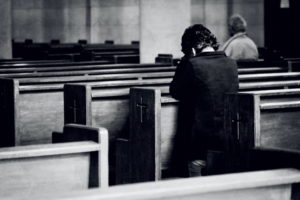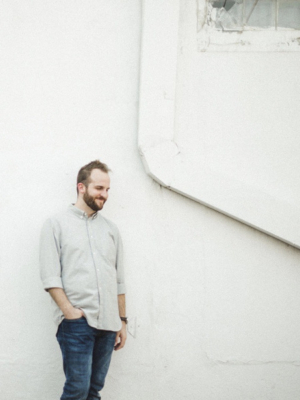A Man Who Literally Goes to Therapy
A meme started going around this year that hit close to home. It goes like this: “Men will literally ___ instead of going to therapy.” There are many of them, and a lot are hilarious. They poke fun at deserving men (“Men will literally run for president instead of going to therapy,” “Men will literally invent Facebook instead of going to therapy”) and the toxic behaviors of literary characters (“Men will literally hide a portrait of themselves that ages while their physical form stays young and beautiful instead of going to therapy”).
I grew up in a Christian environment in Texas, where therapy wasn’t something people did or talked about openly. Instead, I was raised to take everything to God in prayer. Anything that troubled us would eventually be answered, even if it wasn’t the answer we wanted. I learned it was not so much that I needed a response as I needed to articulate my thoughts, to hear myself thinking through a situation — or feeling in communication with someone or something I believed was outside of myself.
A few years ago, my prayers weren’t working. I’d taught middle school for three years when something started to feel off. It wasn’t that I didn’t love my job. But I had become comfortable with teaching, and that comfort quickly led to stagnancy. Was this all there was? I began to worry that my entire life had been decided without me, that I would be stuck living out my days repeating the same grammar lessons. I had joined a teaching program on a two-year commitment, and I loved education, but I wasn’t sure if it was a forever thing. In year three, I felt that staying any longer would mean teaching was my career before I had followed other dreams.
In particular, I had thought about an MFA in creative writing, but I didn’t believe in my writing enough to apply to schools. I also loved the study of religion, and I had considered following that path. My confidence about my writing was low, but I had found some success in researching popular culture and religion through a few conferences. So, I applied to graduate programs in religion and ultimately chose a seminary that was close to home and offered the best scholarship.
The feelings of dread did not go away. I was going after my dream of researching, writing, and teaching at the college level, but it didn’t feel like I thought it would—I thought doing what I was meant to do would be an answer to my prayer, a lifting of the heaviness that weighed me down. But I was still listless, waking up and wondering if I had done the right thing. Back then, I still believed my life had a path I just needed to follow. If I talked to God and allowed that voice to speak to me and tell me where to go, I would never be lost. Only I didn’t hear the voice, and I lost sight of whatever path there might be. I had left a solid career for a dream that might not materialize. I had lost the plot of my story.
When I saw the “Men will literally __ instead of going to therapy” meme, there was one that elicited an audible “ouch” from me: “Men will literally join the seminary instead of going to therapy.” It was too on-the-nose. Instead of seeking professional help to sort through my feelings of unhappiness, I wrongly assumed that a change of setting would fix my issues with plot.
Grad school was only five years ago, but already I have forgotten much of what happened. I don’t know how I ended up there, but I remember leaving class one day and making the long walk across campus to the counseling center. I had never been to therapy. I’m sure someone must have suggested it, or maybe a voice inside—was it still God or just me?—compelled me to go.
When I entered the quiet building tucked underneath a dormitory, I approached the window to speak with the receptionist. I didn’t know how to say I needed to talk to someone, so when the person behind the glass asked how she could help me, I leaned forward and quietly mumbled something about feeling down. I don’t remember what either of us said, but soon I was shuffled to a computer screen where I answered a series of questions I would later learn was the Beck Depression Inventory (BDI).
When I submitted the test, I knew I was going to be flagged for something. I was heavy with a deeper shade of sadness than I had known in a long time. I couldn’t see straight. I didn’t feel like myself. I sat in the waiting room staring at the floor, hoping to remain unseen by anyone who entered. I wanted to be invisible.
When I met the therapist, she went over the BDI with me and asked me questions about my life, and we began to unravel the threads that had bound me up and squeezed until I couldn’t feel anything but numb. Not unlike prayer, I expressed my thoughts to another. Only now, there was another person present who helped me articulate what I could not name, to put words to feelings until I began to feel like I could navigate them. When it felt like my prayers weren’t going anywhere, therapy helped me to feel better, little by little.
While reading the various takes on the meme is entertaining, they point to a deeper truth about men. Toxic masculinity teaches men to bottle feelings up and treat them as nonexistent. Toxic masculinity teaches men to be aggressive instead of vulnerable. Toxic masculinity teaches men to be violent—toward themselves, or others, or both—instead of tender. Rather than go to therapy to learn to heal ourselves, we too often choose the avoidant path.
This path portends tragic consequences not only for our own well-being but that of others around us. Misogyny, white supremacy, and a host of other societal ills feed on toxic masculinity. We saw it in Atlanta when a man killed eight people, six of whom were Asian women, and blamed it on a sex addiction. We see it almost every time a mass shooting happens: a man kills, then blames it on something besides his own ability to find healthy outlets for his rage, isolation, or sadness.
That’s not to say mental health resources are readily available to all. I received free counseling in school because I was paying tuition, but my health insurance as a teacher doesn’t cover my biweekly sessions. But for the variety of reasons that men do not or can’t seek out therapy, the result is men often don’t learn how to become whole, and the world suffers, and too often it is women and people of color who are targeted by men. We need new models for how to be.
I married my partner in the midst of my grad school depression. My BDI indicated I had social anxiety, which often manifested in a general distrust of people. I was always waiting for someone to betray me. Sometimes miscommunication between me and my partner would lead to me having panic attacks in the midst of an argument that could have been resolved with a simple conversation. But I did not have the tools to state my feelings plainly, so instead I bottled them up until I used the wrong words in the wrong tone. Feeling hurt, I would say something intended to hurt back.
But because I love my partner, I owed it to her to learn better methods. People who love each other will inevitably hurt one another, which makes it even more important to work on outgrowing unhealthy manners of communication. We attended counseling together in the first year of our marriage and learned how to fight fair. So often we had heard that marriage counseling meant there was a problem that might end a relationship, but what we found was not shameful at all. We talked through being better to one another and to ourselves.
In the midst of the pandemic, I realized my job was taking a toll on me. After finishing my degree in theology, I returned to teach at the school I had worked for previously. Through therapy, I learned that my job doesn’t define me, and I’ve been able to separate my identity—and subsequently, my happiness—from my work. In the past year, however, Texas schools offered remote learning but required staff to be on campus. I didn’t feel safe going back, but I felt I had no choice. I accepted a coordinator role so I could stay in an office mostly by myself, but the stress of the job in the midst of the past year has been a lot to carry.
I recognized I needed to go back to counseling to get help with managing my stress, but even after my past positive experiences with therapy, I dragged my feet for months. My partner suggested going to her counselor, the one we went to years ago, but I kept an email to her in draft form. When I finally sent it, and she responded to me, I made every excuse possible: the money, the time, the false idea that I should be grateful for having a job right now and not complain. I would let weeks lapse between my responses, hoping it would just go away even as I sensed I needed it.
The truth is we all need help. We all need people we can articulate our thoughts to and hope they will help us to respond to our lives. For my mom, that has always been God. She tells me about her walks where she spends the entire time praying for herself and the people on her mind, including me. I love that for her, and I covet her prayers along with the prayers my sister and friends say for me. But I know I need a trained professional to sit in front of me and help me to see things differently, to know it’s okay to talk through the trials of my day. I don’t think therapy and prayers are mutually exclusive. Often, they can speak through and to one another.
I smiled at the “Men will literally ___ instead of going to therapy” memes, but they also saddened me. I want every man to go to therapy and learn how to cope with life in healthy ways. Existing is hard. It’s too difficult to do alone. And because the United States doesn’t value mental health like it values guns, men will often take the available route while we wring our hands and wonder how to prevent the next act of violence. Politicians often speak shallowly about mental health when what they are really doing is deflecting their responsibility to life and the wholeness of people. I don’t want men to be humanized by the media after they commit violent acts against others. I want men to be humanized before they become violent, to never become violent at all. I want people to not have to feel afraid of what hurt men might do.
I’m so thankful I found therapy. It’s an answer to a prayer I’ve been saying my whole life.
Ben Lewellyn-Taylor lives in Dallas, TX. He is an MFA student in Antioch University’s low-residency program. His essays and reviews appear in various publications, all of which can be found on bentaylorblogs.com.






